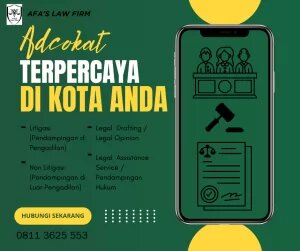Best Real Estate Contracts and Negotiations Lawyers in Indonesia
Share your needs with us, get contacted by law firms.
Free. Takes 2 min.
Free Guide to Hiring a Real Estate Lawyer
Or refine your search by selecting a city:
List of the best lawyers in Indonesia
About Real Estate Contracts and Negotiations Law in Indonesia
Real estate contracts and negotiations in Indonesia are governed by a mix of local and national laws that are designed to regulate transactions involving land and property. These laws ensure that real estate transactions are conducted fairly, transparently, and in alignment with the country’s legal framework. The legal landscape in Indonesia includes regulations that cover aspects such as ownership rights, transfer of property, lease agreements, and mortgage contracts. Understanding these laws is crucial for anyone involved in buying, selling, or managing property in Indonesia.
Why You May Need a Lawyer
There are several situations where you may require legal assistance in real estate contracts and negotiations in Indonesia:
- Ensuring Compliance: Indonesian law requires all real estate transactions to comply with national and local regulations. A lawyer can help ensure that your contract complies with these laws.
- Property Disputes: When disputes arise over property boundaries, ownership, or breaches of contract, a lawyer can provide necessary representation and negotiate a resolution.
- Complex Transactions: High-value or complex transactions often require detailed contract drafting and negotiations, which may need specialist legal expertise.
- Foreign Investment: Foreign nationals looking to invest in Indonesian real estate need to navigate specific regulations that a local lawyer can elucidate.
- Due Diligence: Performing due diligence on property transactions to avoid potential legal pitfalls or financial losses is another critical area where legal advice is beneficial.
Local Laws Overview
Several key aspects of local laws are particularly relevant to real estate contracts and negotiations in Indonesia:
- Land Ownership: Various types of land rights are recognized, including Hak Milik (freehold title), Hak Guna Bangunan (right to build), and Hak Pakai (right to use). Understanding these distinctions is crucial for property buyers.
- Foreign Ownership Restrictions: Indonesian law sets certain restrictions regarding land ownership by foreigners to preserve national sovereignty over land rights.
- Lease Agreements: These contracts must adhere to particular formalities to be legally binding, and lawyers often assist in drafting or reviewing these agreements.
- Registration Process: Real estate transactions require thorough documentation and registration with the National Land Agency (BPN) to ensure validity and legal protection.
- Tax Implications: There are specific taxes such as Land and Building Acquisition Duty (BPHTB) that buyers and sellers must consider when transacting real estate.
Frequently Asked Questions
What is the basic process for buying property in Indonesia?
The process typically involves identifying property, conducting due diligence, negotiating a sale agreement, drafting a sale-purchase agreement (PPJB), and transferring land rights through the BPN.
Can foreigners own property in Indonesia?
Foreigners face restrictions on land ownership and typically acquire land rights through long-term lease agreements or by purchasing apartments, where applicable laws permit.
What are the most common types of land rights?
The most common types include Hak Milik (freehold title), Hak Guna Usaha (right to cultivate), Hak Guna Bangunan (right to build), and Hak Pakai (right to use).
How are disputes in real estate transactions typically resolved?
Disputes can be resolved through negotiation, mediation, arbitration, or litigation, with the assistance of legal counsel to guide and represent the involved parties.
Do I need to get a notary involved in property transactions?
Yes, in Indonesia, a notary is required to legalize property transactions to ensure they meet all legal requirements.
What taxes are involved in purchasing real estate?
Buyers typically pay the Acquisition Duty of Right on Land and Building (BPHTB) and potential ongoing property taxes. Sellers may be subject to sales taxes.
What is a Hak Guna Bangunan title?
Hak Guna Bangunan (HGB) is a legally recognized right to construct and own buildings on another party's land for a set period. It's renewable and often used for commercial purposes.
How long does the land registration process take?
The registration process can vary from a few weeks to several months, depending on the area and the efficiency of the National Land Agency in that region.
Is it necessary to hire a local lawyer for real estate transactions?
While not legally mandatory, hiring a local lawyer is highly recommended to navigate Indonesian laws effectively, particularly for foreign buyers.
How secure is property investment in Indonesia?
Indonesia provides legal frameworks to secure property investments, but understanding local regulations, adhering to due diligence, and leveraging professional advice are essential for minimizing risks.
Additional Resources
Consider consulting the following resources and organizations for more information and assistance:
- National Land Agency (Badan Pertanahan Nasional - BPN)
- Indonesian Real Estate Association (REI)
- Local real estate law firms specializing in property law
- Indonesia Investment Coordinating Board (BKPM) for guidelines on foreign investments
Next Steps
If you require legal assistance in real estate contracts and negotiations, follow these steps:
- Identify your legal issue or need (e.g., property purchase, lease agreement).
- Research and select a qualified legal professional or firm specializing in real estate law.
- Prepare relevant documents and questions to discuss with your lawyer.
- Schedule a consultation to understand your legal rights and obligations.
- Discuss potential legal strategies or solutions with your lawyer to resolve the issue or successfully negotiate your contract.
Lawzana helps you find the best lawyers and law firms in Indonesia through a curated and pre-screened list of qualified legal professionals. Our platform offers rankings and detailed profiles of attorneys and law firms, allowing you to compare based on practice areas, including Real Estate Contracts and Negotiations, experience, and client feedback.
Each profile includes a description of the firm's areas of practice, client reviews, team members and partners, year of establishment, spoken languages, office locations, contact information, social media presence, and any published articles or resources. Most firms on our platform speak English and are experienced in both local and international legal matters.
Get a quote from top-rated law firms in Indonesia — quickly, securely, and without unnecessary hassle.
Disclaimer:
The information provided on this page is for general informational purposes only and does not constitute legal advice. While we strive to ensure the accuracy and relevance of the content, legal information may change over time, and interpretations of the law can vary. You should always consult with a qualified legal professional for advice specific to your situation.
We disclaim all liability for actions taken or not taken based on the content of this page. If you believe any information is incorrect or outdated, please contact us, and we will review and update it where appropriate.
Browse real estate contracts and negotiations law firms by city in Indonesia
Refine your search by selecting a city.
















